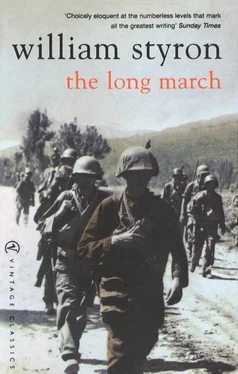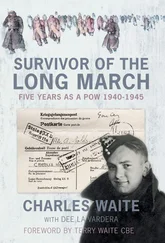William Styron - The Long March
Здесь есть возможность читать онлайн «William Styron - The Long March» весь текст электронной книги совершенно бесплатно (целиком полную версию без сокращений). В некоторых случаях можно слушать аудио, скачать через торрент в формате fb2 и присутствует краткое содержание. Город: New York, Год выпуска: 1952, ISBN: 1952, Издательство: Vintage Classics, Жанр: prose_military, на английском языке. Описание произведения, (предисловие) а так же отзывы посетителей доступны на портале библиотеки ЛибКат.
- Название:The Long March
- Автор:
- Издательство:Vintage Classics
- Жанр:
- Год:1952
- Город:New York
- ISBN:978-0099422792
- Рейтинг книги:3 / 5. Голосов: 1
-
Избранное:Добавить в избранное
- Отзывы:
-
Ваша оценка:
- 60
- 1
- 2
- 3
- 4
- 5
The Long March: краткое содержание, описание и аннотация
Предлагаем к чтению аннотацию, описание, краткое содержание или предисловие (зависит от того, что написал сам автор книги «The Long March»). Если вы не нашли необходимую информацию о книге — напишите в комментариях, мы постараемся отыскать её.
The Long March — читать онлайн бесплатно полную книгу (весь текст) целиком
Ниже представлен текст книги, разбитый по страницам. Система сохранения места последней прочитанной страницы, позволяет с удобством читать онлайн бесплатно книгу «The Long March», без необходимости каждый раз заново искать на чём Вы остановились. Поставьте закладку, и сможете в любой момент перейти на страницу, на которой закончили чтение.
Интервал:
Закладка:
And although Mannix was close by, he felt profoundly alone. Something that had happened that evening—something Mannix had said, or suggested, perhaps not even that, but only a fleeting look in the Captain’s face, the old compressed look of torment mingled with seething outrage—something that evening, without a doubt, had added to the great load of his loneliness an almost intolerable burden. And that burden was simply an anxiety, nameless for the moment and therefore the more menacing. It was not merely the prospect of the hike. Exhaustion had just made him vulnerable to a million shaky, anonymous fears—fears which he might have resisted had he felt strong and refreshed, or younger. His age was showing badly. All this would have been easy at twenty-three. But he was thirty, and seventy-two virtually sleepless hours had left him feeling bushed and defeated. And there was another subtle difference he felt about his advanced age—a new awakening, an awareness—and therein lay the reason for his fears.
It was simply that after six years of an ordered and sympathetic life—made the more placid by the fact that he had assumed he had put war forever behind him—it was a shock almost mystically horrifying, in its unreality, to find himself in this new world of frigid nights and blazing noons, of disorder and movement and fanciful pursuit. He was insecure and uprooted and the prey of many fears. Not for days but for weeks, it seemed, the battalion had been on the trail of an invisible enemy who always eluded them and kept them pressing on—across swamps and blasted fields and past indolent, alien streams. This enemy was labeled Aggressor, on maps brightly spattered with arrows and symbolic tanks and guns, but although there was no sign of his aggression he fled them nonetheless and they pushed the sinister chase, sending up shells and flares as they went. Five hours’ pause, five hours in a tent somewhere, lent to the surrounding grove of trees a warm, homelike familiarity that was almost like permanence, and he left each command post feeling lonely and uprooted, as they pushed on after the spectral foe into the infinite strangeness of another swamp or grove. Fatigue pressed down on his shoulders like strong hands, and he awoke in the morning feeling weary, if he ever slept at all. Since their constant movement made the sunlight come from ever-shifting points of the compass, he was often never quite sure—in his steady exhaustion—whether it was morning or afternoon. The displacement and the confusion filled him with an anxiety which would not have been possible six years before, and increased his fatigue. The tent itself, in its tiny, momentary permanence, might have had all of the appeal of the home which he so desperately hungered for, had it not been so cold, and had it not seemed, as he sat there suddenly shivering with fear, so much more like a coffin instead.
Then it occurred to him that he was actually terrified of the march, of the thirty-six miles: not because of the length—which was beyond comprehension—but because he was sure he’d not be able to make it. The contagion of Mannix’s fear had touched him. And he wondered then if Mannix’s fear had been like his own: that no matter what his hatred of the system, of the Marine Corps, might be, some instilled, twisted pride would make him walk until he dropped, and his fear was not of the hike itself, but of dropping. He looked up at Mannix and said, “Do you think you can make it, Al?”
Mannix heavily slapped his knee. He seemed not to have heard the question. The giddy sensation passed, and Culver got up to warm his hands at the lamp.
“I’ll bet if Regiment or Division got wind of this they’d lower the boom on the bastard,” Mannix said.
“They have already. They said fine.”
“What do you mean? How do you know?”
“He said so, before you came in. He radioed to the base for permission, or so he said.”
“The bastard.”
“He wouldn’t dare without it,” Culver said. “What I can’t figure out is why Regiment gave him the O.K. on it.”
“The swine. The little swine. It’s not on account of H & S Company. You know that. It’s because it’s an exploit. He wants to be known as a tough guy, a boondocker.”
“There’s one consolation, though,” said Culver, after a pause, “if it’ll help you any.”
“What, for God’s sake?”
“Old Rocky, or whatever they call him, is going to hike along, too.”
“You think so?” Mannix said doubtfully.
“I know so. So do you. He wouldn’t dare not push along with his men.”
Mannix was silent for a moment. Then he said viciously, as if obsessed with the idea that no act of Templeton’s could remain untainted by a prime and calculated evil: “But the son of a bitch! He’s made for that sort of thing. He’s been running around the boondocks for six years getting in shape while sane people like you and me were home living like humans and taking it easy. Billy Lawrence, too. They’re both gung ho. These fat civilians can’t take that sort of thing. My God! Hobbs! Look at that radioman, Hobbs. That guy’s going to keel over two minutes out—” He rose suddenly to his feet and stretched, his voice stifled by the long, indrawn breath of a yawn. “Aaa-h, fuck it. I’m going to hit the sack.”
“Why don’t you?”
“Fine bed. A poncho in a pile of poison ivy. My ass looks like a chessboard from chigger bites. Jesus, if Mimi could see me now.” He paused and pawed at his red-rimmed eyes. “Yeah,” he said, blinking at his watch, “I think I will.” He slapped Culver on the back, without much heartiness. “I’ll see you tomorrow, sport. Stay loose.” Then he lumbered from the tent, mumbling something: be in for fifty years.
Culver turned away from the lamp. He sat down at the field desk, strapping a black garland of wires and earphones around his skull. The wild, lost wail of the radio signal struck his ears, mingling with the roar, much closer now, of the lamp; alone as he was, the chill and cramped universe of the tent seemed made for no one more competent than a blind midget, and was on the verge of bursting with a swollen obbligato of demented sounds. He felt almost sick with the need for sleep and, with the earphones still around his head, he thrust his face into his arms on the field desk. There was nothing on the radio except the signal; far off in the swamp the companies were sleeping wretchedly in scattered squads and platoons, tumbled about in the cold and the dark, and dreaming fitful dreams. The radios were dead everywhere, except for their signals: a crazy, tortured multitude of wails on which his imagination played in exhaustion. They seemed like the cries of souls in the anguish of hell, if he concentrated closely enough, shrill cracklings, whines, barks and shrieks—a whole jungle full of noise an inch from his eardrum and across which, like a thread of insanity, was strung the single faint fluting of a dance-band clarinet—blown in from Florida or New York, someplace beyond reckoning. His universe now seemed even more contained: not merely by the tiny space of the tent, but by the almost tangible fact of sound. And it was impossible to sleep.
Besides, something weighed heavily on his mind; there was something he had forgotten, something he was supposed to do…
Then suddenly he remembered the Colonel’s instructions. He cleared his throat and spoke drowsily into the mouthpiece, his head still resting against his arms. “This is Bundle Three calling Bundle Able. This is Bundle Three calling Bundle Able. This is Bundle Three calling Bundle Able. Do you hear me? Over…” He paused for a moment, waiting. There was no answer. He repeated: “This is Bundle Three calling Bundle Able, this is Bundle Three calling Bundle Able, this is… .” And he snapped abruptly erect, thinking of Mannix, thinking: to hell with it: simply because the words made him feel juvenile and absurd, as if he were reciting Mother Goose.
Читать дальшеИнтервал:
Закладка:
Похожие книги на «The Long March»
Представляем Вашему вниманию похожие книги на «The Long March» списком для выбора. Мы отобрали схожую по названию и смыслу литературу в надежде предоставить читателям больше вариантов отыскать новые, интересные, ещё непрочитанные произведения.
Обсуждение, отзывы о книге «The Long March» и просто собственные мнения читателей. Оставьте ваши комментарии, напишите, что Вы думаете о произведении, его смысле или главных героях. Укажите что конкретно понравилось, а что нет, и почему Вы так считаете.






![Джеффри Арчер - The Short, the Long and the Tall [С иллюстрациями]](/books/388600/dzheffri-archer-the-short-the-long-and-the-tall-s-thumb.webp)





